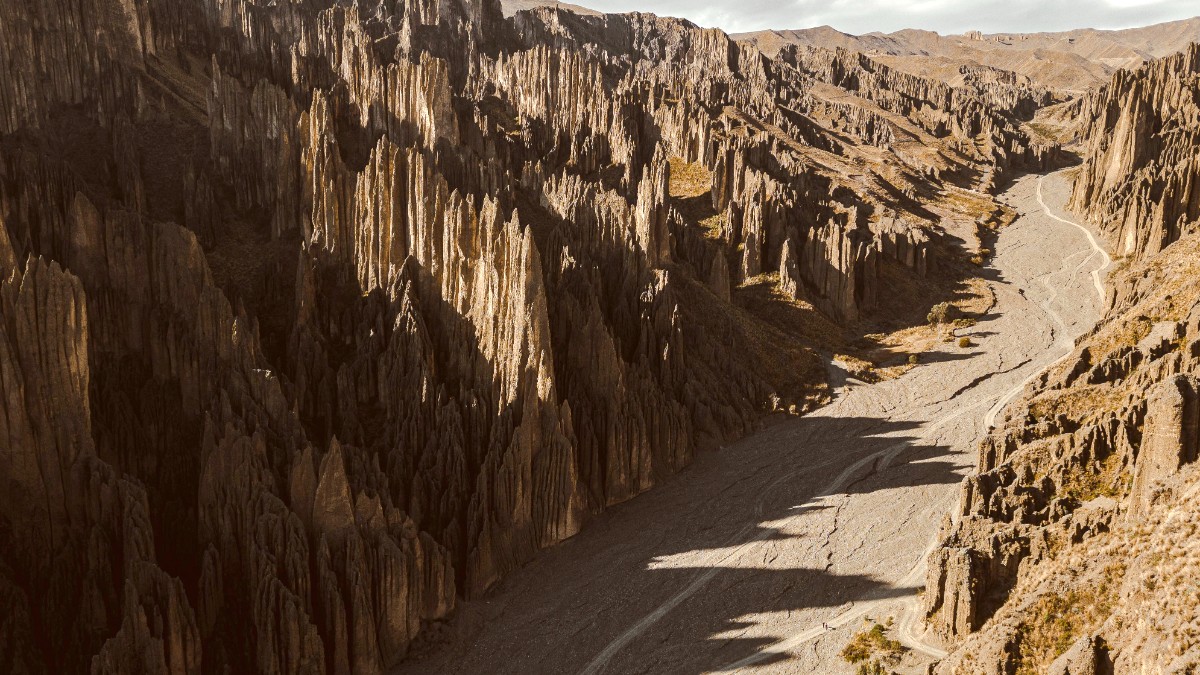
Bolivia
Bolivian cuisine features ingredients cultivated in the Andes for millennia: potatoes (with thousands of varieties), corn, quinoa, and various meats (beef, chicken, pork, and llama).
High altitude affects cooking times as water boils at a lower temperature. The cuisine warms and nourishes, providing energy for mountain life.
Typically light: bread with jam or cheese, coffee or tea. Street vendors sell salteñas or api con buñuelos for a more substantial start.
The main meal. Many restaurants feature a "menú del día" including soup, main course (meat, potatoes, rice), and a drink at a reasonable price.
A mid-afternoon snack around 4-5 PM. Popular items: salteñas, tucumanas, or api con buñuelos.
Savory baked pastries, juicy, with a sweet and savory broth, diced meat, potatoes, and vegetables.
Find at Paceña La Salteñan or Castedo.
A large platter of diced beef, frankfurter sausages, French fries, onions, and locoto. Designed for sharing.
Found in local restaurants.
A creamy, flavorful soup made with ground peanuts, often with meat, potatoes, and pasta. A comforting staple.
Served as a first course in 'almuerzo' menus.
Empanadas (fried/baked pastries), anticuchos (grilled beef heart skewers), tucumanas (fried savory pastries).
Non-alcoholic: Mate de Coca, Api, fresh fruit Jugos. Alcoholic: Paceña beer, Singani (grape brandy), Chuflay, Sucumbé.
Historically, Gustu was internationally renowned for its innovative Bolivian cuisine. Modern Bolivian cuisine with a sophisticated touch.
French and Bolivian fusion cuisine in a pleasant setting. Popular Indian and vegetarian/vegan options with healthy and flavorful dishes.
Central markets feature numerous food stalls for affordable, hot meals. Street vendors sell snacks and quick bites.
Increasing availability, especially in Sopocachi and Zona Sur. Many traditional dishes are naturally vegetarian. Restaurants specifically catering to these diets exist.
Look for Prana or Namaste. Quinoa and corn are naturally gluten-free staples.
Halal and Kosher: Very limited. Stick to vegetarian or prepare own food. Gluten-Free: Becoming recognized, especially in upscale or international restaurants.
Always communicate allergies clearly in Spanish. Carry a Translation card for specific allergies.
Learn to prepare traditional Bolivian dishes. Insight into local ingredients and techniques.
Guided walking tours on street food, local markets, and traditional eateries for cultural context and safety.
Peñas feature live traditional music and dance performances (Pena Naira, Wira Wira).
Alasitas Fair (miniature foods), Aymara New Year (traditional food rituals).
Always wash or sanitize your hands before eating, especially street food.
Carry hand sanitizer for convenience.
Drink only bottled or purified water. Avoid ice unless you confirm its source.
Tap water is not safe to drink in La Paz.
Many mid-range and fine dining restaurants present menus in Spanish. Some also English translations.
Tipping is not mandatory but appreciated in sit-down restaurants for good service. A small percentage (5-10%) of the bill is customary.
Restaurants or bars featuring live traditional music (folklore) and dance performances. An enjoyable evening of cultural entertainment.
A unique and popular spectacle held in El Alto on Sundays. A fun and energetic experience, blending sport with cultural display.
Observing or respectfully participating in an offering to Pachamama with a Yatiri (traditional Aymara healer) at the Witches' Market. A profound cultural experience.
Offers traditional Aymara dining experiences, sometimes including explanations of the cultural significance of the food and rituals.
A unique cultural and culinary journey.
At the Witches' Market, Yatiri (traditional healers) offer services from readings to blessings and herbal remedies.
A chance to connect with ancient Andean practices.
Spanish language schools are available in La Paz, offering various courses from intensive short-term programs to longer immersion experiences.
Not typically available within La Paz city limits. Arrange these as part of multi-day excursions to surrounding rural areas, like the Yungas region for coffee farms.
Explore local cafes in Sopocachi and the city center for freshly brewed Bolivian coffee. Coffee from the Yungas region is specifically renowned.
Be adventurous and try new dishes! Many local eateries present English menus. Always check restaurant hours, as some close between lunch and dinner.